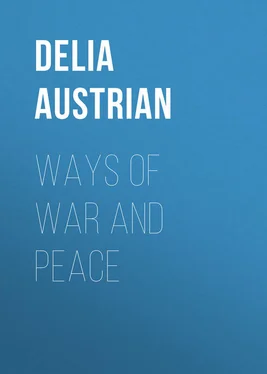Delia Austrian - Ways of War and Peace
Здесь есть возможность читать онлайн «Delia Austrian - Ways of War and Peace» — ознакомительный отрывок электронной книги совершенно бесплатно, а после прочтения отрывка купить полную версию. В некоторых случаях можно слушать аудио, скачать через торрент в формате fb2 и присутствует краткое содержание. Жанр: foreign_antique, foreign_prose, на английском языке. Описание произведения, (предисловие) а так же отзывы посетителей доступны на портале библиотеки ЛибКат.
- Название:Ways of War and Peace
- Автор:
- Жанр:
- Год:неизвестен
- ISBN:нет данных
- Рейтинг книги:5 / 5. Голосов: 1
-
Избранное:Добавить в избранное
- Отзывы:
-
Ваша оценка:
- 100
- 1
- 2
- 3
- 4
- 5
Ways of War and Peace: краткое содержание, описание и аннотация
Предлагаем к чтению аннотацию, описание, краткое содержание или предисловие (зависит от того, что написал сам автор книги «Ways of War and Peace»). Если вы не нашли необходимую информацию о книге — напишите в комментариях, мы постараемся отыскать её.
Ways of War and Peace — читать онлайн ознакомительный отрывок
Ниже представлен текст книги, разбитый по страницам. Система сохранения места последней прочитанной страницы, позволяет с удобством читать онлайн бесплатно книгу «Ways of War and Peace», без необходимости каждый раз заново искать на чём Вы остановились. Поставьте закладку, и сможете в любой момент перейти на страницу, на которой закончили чтение.
Интервал:
Закладка:
HOW WOULD YOU LIKE TO BE A REFUGEE?
How would you like to be a refugee for four weeks, fleeing from the horrors and hardships of war? How would you like to be cut off all this time by mail and cable from relatives and friends? How would you like to be many thousand miles from home, with little money and no credit, trying to meet your obligations and at the same time sharing the little you have with those less fortunate than you are?
This is a brief summary of my experience won from the war. The situation looked so hopeless because the war came like a thunderbolt out of a clear sky. I was at Bad Kissingen in Southern Bavaria when the news came that Austria was threatening Servia with war. Though some of the alarmists were confident that this meant the beginning of a world war, the German papers assured the nations that everything was being done to confine the war to Austria and Servia. Even the Austrian Emperor had said that his country had started the war and it was up to him to work out his own salvation.
I was therefore more surprised when the word came on Saturday that Russia had mobilized for the purpose of crossing the German frontier. This mere threat seemed to paralyze most of the Americans who were busy taking their cures in this Bavarian resort, for until then they had only heard war spoken of at far range. Many of them went mornings and afternoons to the Kurgarten and tried to drown their sorrows in the beautiful strains of the Viennese orchestra, which they listened to in a listless way. The thought uppermost in their minds was how would we get out if Russia really declared war on Germany?
The most panicky and energetic got busy and left, but most of the Americans tried to pull themselves together and to wait for further developments. Our unsteady nerves and heavy hearts were reassured by the articles in all the German dailies saying that they were doing their level best to stay out of the fight and to keep the war confined to Austria and Servia. The foreign diplomats, even of England, gave the same reassuring reports. This promise of good faith and friendship was given out on Saturday, so on Sunday when word came that Russia had been mobilizing for three days to cross the German frontier, it came as a shock. But Germany still tried to ward it off by granting Russia twelve hours to give some sort of explanation for this work. This Russia did by sending some of her forces across the German frontier.
By noon on Sunday our sanitarium was in a pandemonium of excitement, as it became known that many German officers were being recalled and were busy packing their trunks to catch the first afternoon train back to the Prussian capital.
I tore down-stairs two steps at a time. In the hallway I met a German countess weeping in real sorrow while her grandmother was trying to console her. When I inquired the reason for all this grief the grandmother said that her grandsons were officers and had been called to their different regiments.
In the dining-room that noon there were one hundred and seventy-five worried men and women of many different nationalities. They were plotting and planning how they could escape the war, or at least get to their homes. The Germans had soon decided to leave without any delay for Berlin, Frankfurt, Munich and other German cities so they could tell each other goodbye before the men started for war.
The Russian merchants and bankers were alarmed and they started for St. Petersburg and Moscow to escape being made prisoners in Germany. There were two Persian princes who hurried to the minister of war and obtained permission to take out their auto-car and started for Lucerne that very afternoon. Many Americans who had auto-cars with them made the same move trying to get to Berlin, The Hague or London, but most of these were shot at before they had gone very far. The two Persian princes barely escaped being shot as Turkish spies.
In less than two hours only thirty-five guests were left in the sanitarium; most of these were Americans and Russians who were wondering if they had not made a mistake by staying. They were comforted when they heard the next day that most of the people who had left had not gotten very far.
The thought that we were living in a military country on the eve of one of the world's greatest wars was just a little nerve-racking. That afternoon we took a carriage drive through the woods to one of the neighboring towns. It was a beautiful summer's day, and it was hard to think that a terrible war was about to break over this placid scene. The picture was made more attractive by the many peasants out for their usual Sunday holiday in their large farm wagons. These carts were crowded with German families of the usual size, children, parents and grandparents. Though they did not look jovial, the expression of their countenances never indicated that they realized that a great war was pending.
It was after five when my mother and I returned to the sanitarium that afternoon. I had been resting less than a half-hour in the large hall when a head-waiter came and threw an extra bulletin in my lap, which read that Germany had mobilized and declared war.
The men seated near me turned pale; they were too stunned to make any comment on the situation. I waited until I had calmed myself and then I bounded up to my room. My mother was resting at the time, and by the way I tore into the room she must have thought a tiger was about to break loose from the zoo.
"It's all up! It's all up!" I cried, as I sounded a bell for a porter to come and help me pack my book-trunk. I cleared the bureau drawers and the tables and he commenced to pack with as much enthusiasm as though we were going off to join a regiment. Then I proceeded to take the dresses out of the wardrobe and began to pile everything high on the beds.
"Have you gone crazy?" my mother said, only to get the determined answer, "No, but we are off tomorrow," as I continued to add more clothes to the great pile. I proceeded to explain that I had engaged a Swiss man to take us across the frontier and then we would decide whether to go to Holland, Belgium or England.
While talking and working, I failed to notice that one of the nurses had been in the room giving my mother some medicine and had overheard the conversation. I was also unaware of the fact that she had gone down-stairs and told the head-doctor that I was informing the patients that Germany had declared war. He sent up one of his assistants, who said that I was creating a panic in his sanitarium. His remarks in German, translated into English, were somewhat like the following:
"You are an egoist to create all this excitement; don't you know that the maids are out in the hall crying?"
I answered that I was sorry if any of the women had been made hysterical by the news but I was in no way responsible for the war.
I soon saw that it was as difficult to combat the egotistical in peace as in war, so I decided to sit steady and await an opportunity. The next morning I went down at six-thirty to see what the fifty thousand guests were doing and how they took the situation. The place about the music-stand was packed with Germans and German-Americans who were listening to such strains as "Der Wacht am Rhein," "Deutchland über Alles," intermingled with our own "Star Spangled Banner." The only comment made on these strains were the cries of "Hoch! Hoch!" from time to time. At the other end of the grounds was another mob of men and women reading the extra bulletin that a Russian regiment had crossed the frontier and Germany had declared war. The men had a worried look and the women were pale and anxious, but all showed magnificent control. There were no cries heard of "Down with Russia!" or "Down with France!" Many of these Germans were still filled with hope that Sir Edward Grey would bring these foreign powers to a satisfactory understanding.
Читать дальшеИнтервал:
Закладка:
Похожие книги на «Ways of War and Peace»
Представляем Вашему вниманию похожие книги на «Ways of War and Peace» списком для выбора. Мы отобрали схожую по названию и смыслу литературу в надежде предоставить читателям больше вариантов отыскать новые, интересные, ещё непрочитанные произведения.
Обсуждение, отзывы о книге «Ways of War and Peace» и просто собственные мнения читателей. Оставьте ваши комментарии, напишите, что Вы думаете о произведении, его смысле или главных героях. Укажите что конкретно понравилось, а что нет, и почему Вы так считаете.












